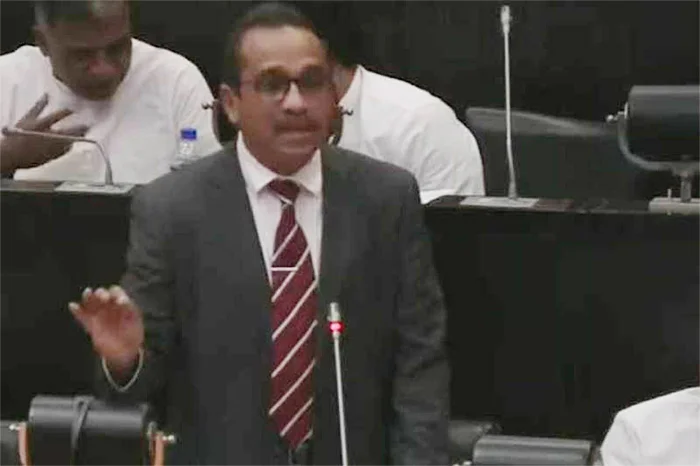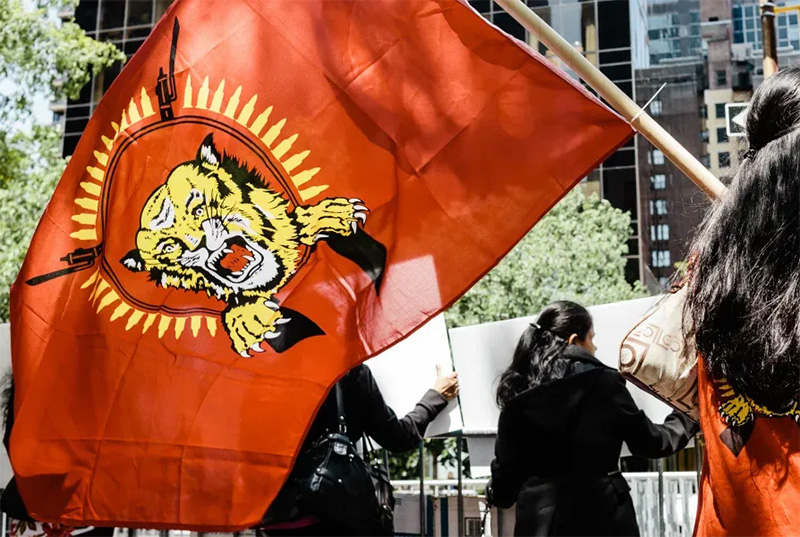News
Bimal claims most of inherited issues already tackled by NPP govt.

By Saman Indrajith
Leader of the House and Transport Minister Bimal Ratnayake told Parliament on Tuesday that during its first 100 days, the JVP/NPP government had to address problems inherited from previous regimes. Most of these issues had now been tackled and were in the process of being solved.
Delivering the concluding speech of the second reading debate on the 2025 Budget from the government benches, Minister Ratnayake stated: “None of these problems were caused by any decisions we made. Yet, we took responsibility for them, as we believe it is our duty to find solutions. We addressed them in a manner that ensures they will not recur. In doing so, we always opted for sustainable solutions.
Soon after assuming power, the government faced several pressing issues, including delays in passport issuance, shortages of rice, coconut, and salt in the market, a backlog in container clearance at the port, and a crisis following the release of the Grade Five scholarship examination results, which threatened to bring parents onto the streets. Additionally, the prices of essential goods reached unprecedented highs, and an underworld killing spree emerged. All these problems were the result of mismanagement by previous administrations.
“We introduced scientific solutions to each of these issues, and all of them are now on the path to being resolved. The passport issuance delay is being addressed, and there are no longer queues at the passport office. We regret the inconveniences caused by the shortages of rice, coconut, and salt. Short-term measures were implemented to address these shortages, and we assure you that these issues will be a thing of the past by next November, thanks to the long-term solutions currently being implemented. Container clearance at the Colombo Port has almost returned to normal levels, and the issue is being resolved in a way that prevents its recurrence. The Grade Five scholarship issue was resolved by the courts, delivering a solution acceptable to the majority of parents and fair to most students. Prices of essential goods are declining, as shown by retail chain statistics, which also indicate an increase in sales. As for the underworld killing spree, the police and security forces have been tasked with bringing it under control,” Ratnayake said.
“In addition, there were two moral issues: the first concerned the education certificates of the former Speaker, and the second involved the name change of a female Opposition MP. Since obtaining the former Speaker’s education certificates from overseas seemed time-consuming, immediate steps were taken to secure his resignation. Regarding the name change issue, Chief Government Whip Minister Nalinda Jayatissa informed the House on the same day that questionable remarks made by one of our MPs would be retracted, and we agreed to expunge them from the Hansard records.
“The 2025 Budget has also been prepared to address policy needs and provide solutions to the many problems our nation faces. A country cannot be developed by economists alone if there is no proper political management in place. Consider African nations with vast deposits of diamonds and oil that remain underdeveloped due to a lack of political management. During the debate, it was mentioned that foreign investors, who had come here with projects worth over $450 billion, turned away and invested elsewhere. This is unsurprising, as they were deterred by the corrupt political environment that prevailed at the time. A country cannot progress without political stability, backed by discipline, social stability upheld by discipline, and financial stability maintained by discipline. This Budget envisions achieving these stabilities.
For us, this is a historic occasion, as it is our first budget. We have long dreamed of presenting a budget of this nature to develop our country in line with our vision for systemic change. This Budget is also a tribute to those who sacrificed their lives for sharing that vision with us to transform this country,” Ratnayake said.
News
Govt. extends ban on LTTE

The NPP government has issued a new extraordinary gazette renewing and extending Sri Lanka’s long-standing ban on the LTTE and several Tamil diaspora organisations and individuals, continuing to designate them as “terrorists”.
The gazette, published recently, replaces a previous gazette issued in May 2025 and reaffirmed the proscription of a wide range of Tamil political and advocacy bodies operating around the world, alongside dozens of named individuals. The government alleged both the organisations and individuals listed are involved in “terrorism-related activities”.
The organisations blacklisted by the Sri Lankan government include:
• Liberation Tigers of Tamil Eelam (LTTE)
• Tamil Rehabilitation Organisation (TRO)
• Tamil Coordinating Committee (TCC)
• World Tamil Movement (WTM)
• Transnational Government of Tamil Eelam (TGTE)
• World Tamil Relief Fund (WTRF)
• National Council of Canadian Tamils (NCCT)
• Tamil Youth Organisation (TYO)
While the majority of the designations mirror those contained in the May 2025 gazette, the latest document updates identification details and addresses for a number of individuals and introduces at least one additional organisation to the list. All entries have been reissued under new reference numbers for 2026, though the underlying allegations and framing remain unchanged.
Successive governemnts have maintained a sweeping proscription regime against Tamil diaspora groups and individuals. A ban can make it a criminal offence for Sri Lankan citizens to maintain contact with these organisations or their members, severely restricting political engagement and stifling links between the diaspora and the Tamil homeland.
The original mass listings were introduced in 2014 under the administration of Mahinda Rajapaksa. Despite repeated outcry, subsequent governments have continued to uphold and renew the proscription regime, even after the Rajapaksas were voted out of power.
News
Police obtain court order banning Wimal’s protest

Police yesterday (12) obtained an injunction order from the Kaduwela Magistrate’s court against the protest launched by National Freedom Front (NFF) leader and former Minister Wimal Weerawansa opposite the Education Ministry, Isurupaya, at Battaramulla.
Police informed Weerawansa of the court order. In line with the court order, the police informed Weerawansa that the road near the Ministry should not be obstructed and that no sound amplification equipment be used while the GCE Advanced Level (A/L) examination is in progress. The examination, put off due to Cyclone Ditwah, recommenced yesterday.
News
Chinese Foreign Minister Wang Yi expresses optimism that Sri Lanka is on the right path to progres

Minister of Foreign Affairs, Foreign Employment and Tourism Vijitha Herath held productive discussions with his Chinese counterpart Wang Yi today (12/01), during the latter’s brief visit to Sri Lanka.
The meeting aimed at further strengthening bilateral engagement and advancing the Strategic Cooperative Partnership between the two countries. Both Ministers reaffirmed the longstanding friendship and time-tested cooperation between Sri Lanka and China rooted in centuries of exchanges and consolidated since the establishment of diplomatic relations seven decades ago. The discussion also focused on enhancing partnership in the areas of trade, investment, development cooperation and tourism.
Minister Herath extended deep appreciation to the Government and the people of China for the steadfast support extended to Sri Lanka following cyclone Ditwah and requested further support for the second phase of resettlement, relocation and rebuilding, particularly for the restoration of affected infrastructure including identified roads, railways and bridges that are vital to connectivity, economic recovery and daily lives of people. Minister Wang assured China’s fullest support for this initiative and expressed confidence that Sri Lanka will continue its rapid recovery under the leadership of President Anura Kumara Disanayaka. He also welcomed the people-centric policies of the Government and expressed optimism that Sri Lanka is on the right path toward fulfilling aspirations of its people.
Minister Herath expressed appreciation for China’s constructive role in international fora and reiterated Sri Lanka’s firm commitment to the One China Policy and China’s sovereignty and territorial integrity.
Both Ministers also recalled the successful high level exchanges in the recent past, including visits of the President and the Prime Minister of Sri Lanka to China in 2025.
-

 News2 days ago
News2 days agoSajith: Ashoka Chakra replaces Dharmachakra in Buddhism textbook
-

 Business2 days ago
Business2 days agoDialog and UnionPay International Join Forces to Elevate Sri Lanka’s Digital Payment Landscape
-

 Features2 days ago
Features2 days agoThe Paradox of Trump Power: Contested Authoritarian at Home, Uncontested Bully Abroad
-

 Features2 days ago
Features2 days agoSubject:Whatever happened to (my) three million dollars?
-

 News2 days ago
News2 days agoLevel I landslide early warnings issued to the Districts of Badulla, Kandy, Matale and Nuwara-Eliya extended
-

 News2 days ago
News2 days agoNational Communication Programme for Child Health Promotion (SBCC) has been launched. – PM
-

 News2 days ago
News2 days ago65 withdrawn cases re-filed by Govt, PM tells Parliament
-

 Opinion4 days ago
Opinion4 days agoThe minstrel monk and Rafiki, the old mandrill in The Lion King – II













